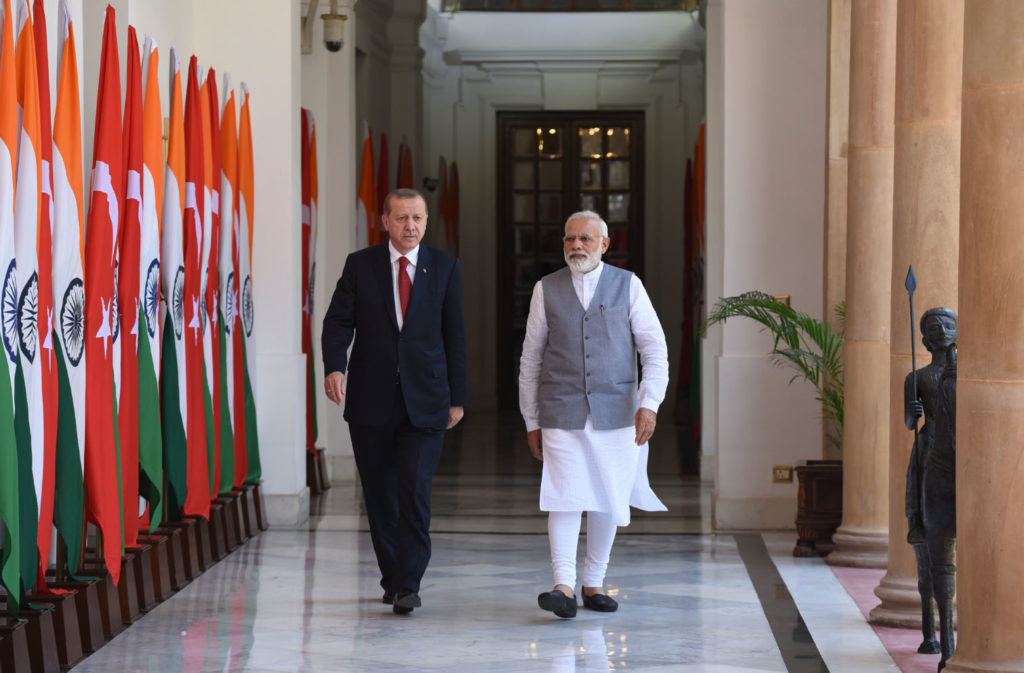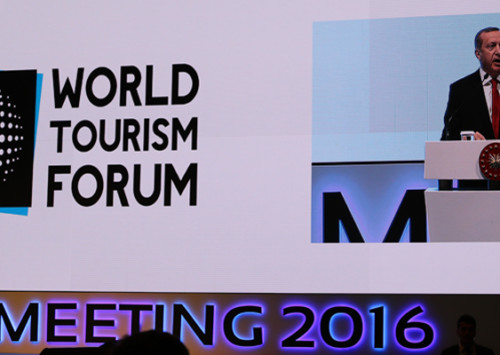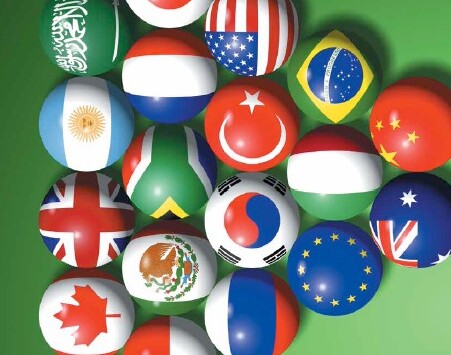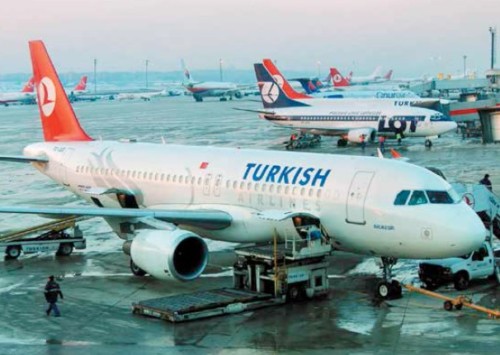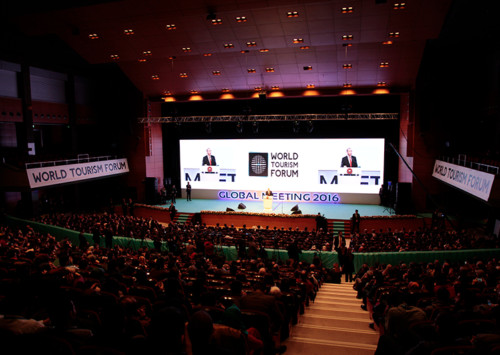Turkey President Erdogan in India for crucial bilateral exchanges
Turkey President, Recep Tayyip Erdogan’s visit to India brings imperative bilateral stance in business and security issues on the table that both countries are prioritising at the moment.
India and Turkey started bilateral talks quite late. It was initiated by the former Prime Minister of India, Atal Bihari Vajpayee. It was way back in 2001, when the then deputy Prime Minister of India, LK Advani visited Turkey as the first high-level dignitary from the Indian government. In 2003, Vajpayee made a landmark visit to Turkey followed by Narendra Modi in 2015, when the latter went to Antalya to meet President Erdogan during the G20 Summit. This is Erdogan’s second visit to India, the first being in 2008 when he was the Prime Minister of Turkey.
Reconsidering India as a close ally, the visit by the Turkish contingent to India comes at a very critical juncture in international politics. On April 16, a referendum in Turkey was floated that proposes to change the parliamentary democracy in the country to an executive structure led by the president. After strengthening his executive powers in the controversial referendum, the Turkish president gave an exclusive interview to Indian TV channel, WION, before his visit to India. He stated that he would like to seek bilateral cooperation from India to solve the Kashmir-dispute and his statement on Nuclear Supplier’s Group was quite clear, “We have been supportive of India and we have been supportive of Pakistan in a similar way. We are not linking the two, and I said that India’s right and Pakistan’s right. They both have nuclear capabilities and we are trying to act very fairly.”
Erdogan landed in India on Sunday and started his meetings and business visits from early morning, today. While business remains a close point of cohesion, the Turkish president’s visit is being seen from the point of investigating clarity on Turkey’s support for Pakistan.
Welcome President @RT_Erdogan – before delegation level talks pic.twitter.com/PA5hIATpxZ
— Sushma Swaraj (@SushmaSwaraj) May 1, 2017
Modi urges reciprocal business
While Erdogan’s intent of visit to India was assumed as bilateral, regional and international issues of mutual interest, the FICCI India-Turkey Business Summit unveiled the primary topics. Along with 150 Turkish business representatives, Erdogan’s visit is allegedly observed in the light of new investment in real estate and construction in India.
Turkish construction companies are deemed as the best in the world and are the closest competitors of the Chinese counterparts. At the summit, inviting Turkish construction companies to India, Modi said, “Turkey’s companies can easily participate in this task of building India faster. We plan to build 50 million houses by 2022. For this purpose, we have repeatedly refined our FDI policy in the construction sector. We are planning metro rail projects in 50 cities and high-speed trains in various national corridors.”
In his interview with WION, Erdogan had said, “India has a population of 1.2 billion compared to the 80 million in Turkey; but, looking at the enormous potential, I think Turkey has many commodities that could be exported to India. Similarly, we can buy a lot more from India.”
Modi urged the conclave of Indo-Turkish cooperation in the fields of science, technology, education, culture and development. He said, “India and Turkey are among the top 20 largest economies in the world. Both economies have shown remarkable stability even in volatile global situations. We are optimistic about our economic prospects. There is immense goodwill for each other between the people of the two countries. Time has come to deepen economic relations.”
Stating that India and Turkey have much more business to converge in the future, Modi in his latest speech and Erdogan in his earlier interview reiterated the same idea that USD 6.5 billion business between the two countries does not do justice to the potential of both the countries. “Our decisions today will certainly drive India-Turkey relationships to a higher level,” Modi concluded.
Erdogan, in his statement to the media in New Delhi, said, “Turkey is interested in deepening its contacts with India. I had a meeting with Sushma Swaraj today in the morning, where we discussed a lot of mutual issues. I too agree with Modi, that our business deals should soon reach USD 10 billion to do justice to our mutual strength.”
Quoting Mahatma Gandhi, Erdogan said, “Power does not come from physical capacity, it comes from indomitable will.”
Highlighted transformative changes underway in India that are making the investment climate more open & facilitating ease of doing business. pic.twitter.com/FjVTrcDTyM
— Narendra Modi (@narendramodi) May 1, 2017
Alley of world politics
India and Turkey have regional issues that are contextual at this point. For Turkey, the crisis in Syria and Iraq, while India has its perennial Kashmir issue with neighbours Pakistan. Erdogan’s visit will also clear the air on the political equation between India, Turkey and Pakistan. It is believed that Pakistan remains a closer ally of Turkey as the former projects itself as a country with Islamic leadership despite India holding the maximum Muslim population in the world.
Erdogan’s pre-visit statements on Kashmir, Pakistan and India’s inclusion as the permanent member of the United Nations Security Council gave a glimpse of Turkey’s perception about India. However, experts believe that the scheme of things might witness a change when Erdogan boards his flight back home. Moreover, India’s membership in the Nuclear Supplier’s Group (NSG) is also a crucial point of discussion between the Modi and Erdogan. It is believed that the undue delay in recognising India’s merits of joining the NSG will get a push if Erdogan and Modi come to a suitable understanding. India and Pakistan are both non-signatories of the Nuclear Non-Proliferation Treaty (NPT). However, Turkey has maintained its stand voicing for a system that will consider entry of the countries which are not a part of the NPT despite repeated opposition from China.
Post Erdogan’s visit, the legacy set by Vajpayee can again come to terms as far as the two nations’ relations are concerned. The regional, international and the bilateral trade relations discussed were contextual and demand a rather positive approach from both the countries.
We had very productive meetings with PM @narendramodi during my visit to India. I thank him and the people of India for the warm welcome. pic.twitter.com/MDfelvxz7j
— Recep Tayyip Erdoğan (@RT_Erdogan) May 1, 2017

